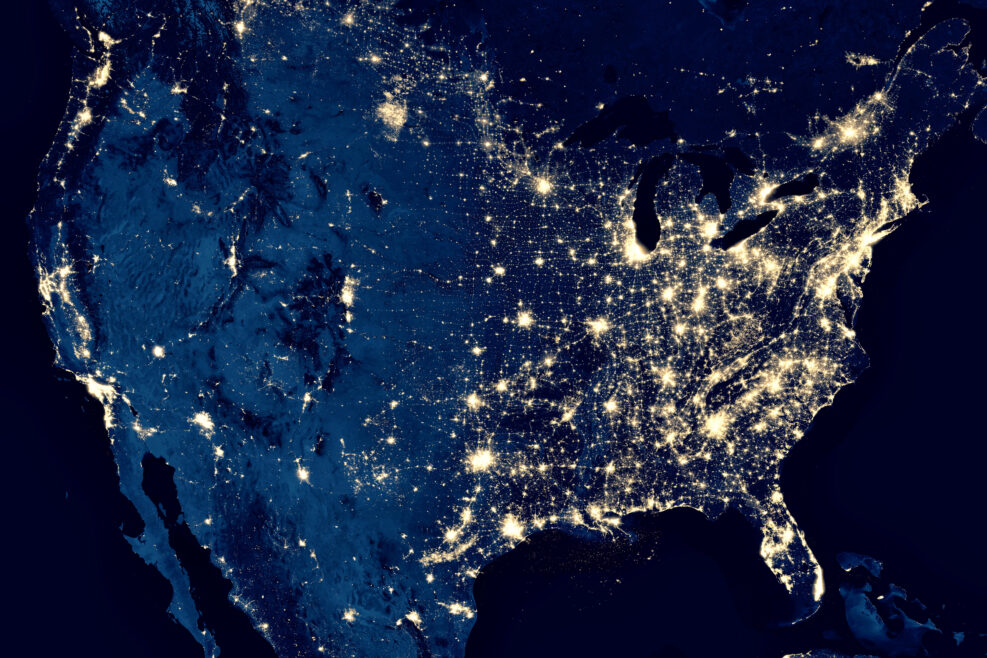
TagUnited States


Big Tech and China
Evaluating the technological competition between the two superpowersHow should the United States deal with China? Jay Richards interviews Dr. Bob Kelly, Managing Partner of Ignition Partners, on a panel he was included in. The panel explored the technological competition between the U.S. and China, what it means for the future, and presented differing schools of thought on how the United States should approach China moving forward. We’ve been sharing a number of lectures from past COSM conferences. This video is just one of many you can find at the Bradley Center’s YouTube page. There you’ll find several lectures, interviews, and panels dealing with issues that range from economics, Big Tech, and artificial intelligence. Notable speakers include 2022 Kyoto Prize winner Carver Mead, venture capitalist Peter Thiel, and George Gilder, co-founder of Discovery Read More ›

Peter Thiel on Big Tech: A Throwback Lecture
Peter Thiel opens up about how artificial intelligence, 5G wireless, and blockchain security are converging in a new eraWe’ve been sharing and promoting several videos from the 2022 COSM conference, but there’s also a wealth of material to be found in the YouTube archives. Today, we’d like to share a lecture from the 2019 conference featuring prominent venture capitalist and technology innovator Peter Thiel. Peter Thiel opens up about how artificial intelligence, 5G wireless, and blockchain security are converging in a new era. In a substantive and wide-ranging discussion with tech guru George Gilder, Thiel outlines how new Internet and monetary systems can remedy the currently torturous relations between the U.S. and China, and how understanding money as time overthrows the prevailing economic and technological models and opens the way to a cornucopian future.

Review of “Power and Progress: Our Thousand-Year Struggle Over Technology and Prosperity”
This new book on tech, AI, and economic prosperity by Daron Acemoglu and Simon Johnson is incredibly timelyThis book by two MIT economists is very timely because the world is now dealing with the latest in the “Thousand Year Struggle,” in the form of artificial intelligence, the claims that many white-collar jobs will be automated, OpenAI’s call for regulation, and the possibility that AI will bring a further concentration of power among the big tech companies. Much of the book sets the stage for this discussion by summarizing the history of technology. This review focuses on the economic and social impact of automation and information technology over the last 50 years. For instance, “the distribution of income between capital and labor began to change significantly in the late 20th century. While throughout most of the century, about Read More ›

Fake Fire at the Pentagon
An AI image of a fire near Pentagon stokes panicAn AI-generated image showing a billowing fire near the U.S. Pentagon caused panic this week. False alarms of an explosion started to proliferate across social media, with even a Russian state outlet reporting on the situation, according to TMZ. Nonetheless, the image showed various distortions and was quickly dismantled as a hoax by a number of vigilant viewers. Even so, the image looks realistic at first glance, and was enough to ignite concern; the incident occurs amidst legislative talks on Capitol Hill over AI regulation. Sam Altman, CEO of OpenAI (which was originally funded by Elon Musk) testified before Congress and noted that while he sees great benefits in new AI systems, the possibilities of their abuses are evident. The Read More ›

The Chinese Spy Balloon Saga, Part 2
China continues to deny that the balloon was used for spying on military basesThe U.S. has shot down four aerial objects this month, one of which was a Chinese surveillance balloon that had traversed the U.S. from Idaho to the Atlantic Ocean. Part 1 of Mind Matters Spy Balloon Saga provides an overview of the four aerial objects that were shot down. Since then, several media outlets found additional information on China’s global high-altitude balloon program, including that the balloon shot down in the Atlantic likely launched from Hainan Island and was intended to surveil U.S. Pacific military bases in Guam and Hawaii. The balloon inadvertently traversed into the continental U.S. Here is a rundown of what of several media outlets have reported: There are 2 known launch sites in China: Dorbod Banner Read More ›

China Balloons, EMP’s and Bioweapons: A Chilling Possibility
One nuclear burst 250 miles above Kansas could damage most of the power gridNo one has mentioned that the China balloon recently shot down after sailing across the United States could have been weaponized with a bomb or bioweapons. Thankfully, it was not. A single nuclear burst 250 miles above Kansas could destabilize much if not most of the US power grid. Almost the entire country, as well as parts of Mexico and Canada, would be affected by the resulting EMP (electromagnetic pulse). 250 miles above the Earth is about as high as the US Space Station is from Earth. Potential military threats from outer space was a prime motivation for creating the United States Space Force in 2019. The China balloon was not 250 miles up required for a coast-to-coast EMP Read More ›

China Leads the World in Face Recognition Exports
The global power is exporting the AI to weak and autocratic countries, according to a report from Brookings InstituteChina is the world’s leading exporter of facial recognition technology, according to a study conducted by researchers from Harvard and MIT. The study aimed to elucidate the ramifications of the AI revolution and what it means for such technology to be exported from a global power like China. They found that China is more likely than other countries to export AI technology to other countries. China also focuses on exporting facial recognition to countries with weak democracies that are experiencing social unrest and upheaval. Political motivation might be driving such trades. The authors write, The Chinese government’s demand for surveillance and political control translates into more exports of AI. Moreover, our finding that autocrats and would-be autocrats abroad demand surveillance Read More ›

Sci-fi Saturday Books: Will World War III Be the U.S. vs. China?
One thing that is certain is that it will be a cyber warWired Magazine devoted its entire February 2021 issue to the first four chapters of a book depicting a near-future dystopia in which the U.S. goes to war with China. You can read the first part of the book here. The authors of 2034: A Novel of the New World War have military backgrounds and were inspired by Cold War literature that speculated on the worst-case scenario if the U.S. and Russia had gone to war. The reason for the Wired editors’ interest is that 2034 is no ordinary thriller. Admiral James Stavridis comes with a wealth of experience in how such a conflict might play out. He is a retired four-star U.S. naval officer who has received numerous medals and Read More ›

Tech Investment Analysts Strategize How to Deal With China Today
China’s assertions of power in recent years have left many uncertain about the future of business relationshipsRecently, Jay Richards interviewed Dr. Bob Kelly, Managing Partner of Ignition Partners, focusing on the panel he moderated at COSM 2019,“The Crisis of Big Tech: The US and China.” They explored the technological competition between the U.S. and China and what it means for the future. The panelists were futurist George Gilder, Wendy Liu, China market strategy analyst at multinational investment bank UBS, and Gary Rieschel, a venture capitalist in China and the United States. From the interview: Jay Richards: So what was the core controversy if you had to summarize it neutrally? Bob Kelly: I guess I’d say the core controversy really is what stance do we as Americans, or in the technology arena, take towards China? And there’s Read More ›

The New Cyber Cold War with China
Cybersecurity strategist Peter Singer told Wired that there has never been a better time than the COVID-19 pandemic to be a government hackerThe United States has formally accused China of both funding and operating cells of hackers who infiltrate research labs working on responses to COVID-19.
Read More ›
US vs. China: Trade Wars Kill Businesses Rather Than People
That’s why we don’t hear so many songs about themTrade wars are important even if they often sound boring compared with other news. One panel at COSM will examine the underlying issues in the ongoing trade spats between the United States and China.
Read More ›